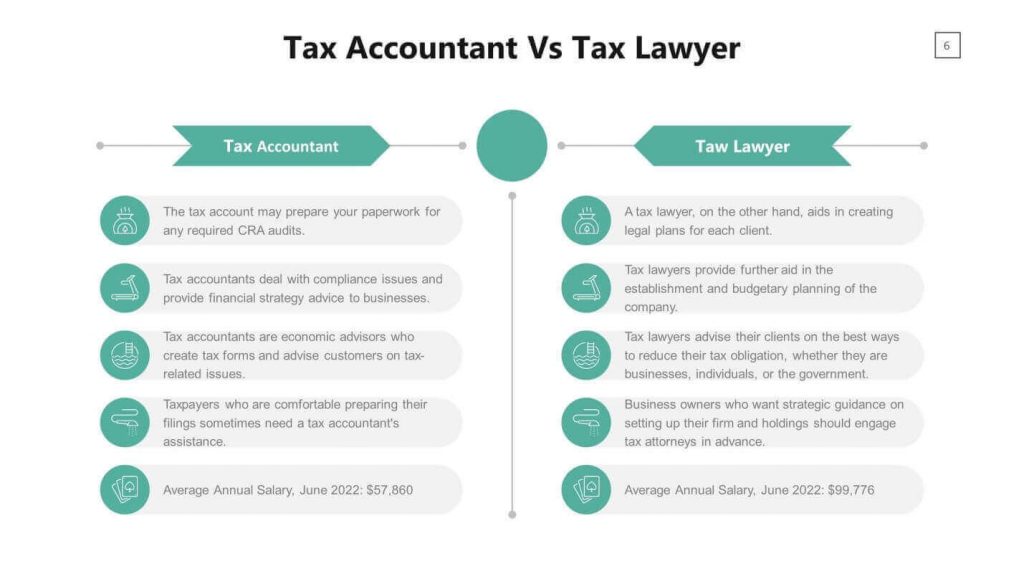
Tax Accountant vs Tax Lawyer | Major Difference Explained in Info-Graphic
The contents of this web page are for informational and educational purposes only, and nothing you read is intended to be legal advice. Please review our disclaimer before taking action based upon anything you read or see.
Who hasn’t gotten defeated in a stare-down with a tax declaration? Each of us has faced fearsome tax forms. The stakes are high, and they are laborious and painstakingly detailed. Making a mistake on your CRA tax payers may be quite expensive, especially if you own a company. That explains why many of us rush to see a professional during tax season. Thus, we have made this post on Tax accountants vs. tax lawyers to aid you.
The most excellent approach to prevent considerable difficulties in the future is to get your taxes done by a professional. But it’s not as simple as it seems to choose the best expert for you. Hiring a tax attorney over a tax accountant depends on several variables. We’ll discuss the functions of tax accountants and attorneys in this post and whether you need both. Come along!
Who are tax accountants?

Tax accountants are economic advisors who create tax forms and advise customers on tax-related issues. They suggest handling assets and coordinating financial activities to lower tax obligations.
What then can they do to help you? You’d better grasp how taxes operate to comprehend it. The two levels of sound financial practices are as follows.
The first is tax planning. The majority of significant financial choices have some economic effects. These might be rather difficult for a firm. Tax accountants develop plans to reduce income taxes and other types of taxes. However, tax accountants have a responsibility to help their customers with their annual tax returns.
They ensure forms are completed and submitted by the required dates, look for deductions, and carefully study the tiny print. Additionally, they maintain a taxpayer in compliance with the law.
Therefore, hiring a tax accountant is a proactive solution to your tax issues. They ensure that problems won’t arise and that tax revenue will get kept to a minimum.
Tax accountant’s aid individuals and businesses file correct tax records that follow all regulatory obligations. They help clients improve profits and minimize charges by applying tax legislation skills.
Some tax accountants work for companies on a full-time, internal basis. Others work for accounting companies or payroll service providers. Tax accountants also get employed by governmental organizations, insurance businesses, and banking and finance corporations. Another choice is working for oneself.
When can you collaborate with a tax accountant?
A tax accountant’s assistance may be quite beneficial in various circumstances. Your scenario will determine exactly when you should contact a tax professional.
For instance, hiring a tax accountant to help with tax preparation might be more than enough. However, a company owner has quite distinct wants and expectations when it comes to taxes.
The distinction between a tax lawyer and a tax accountant may sometimes be hazy regarding more complicated tax concerns like net worth assessments and disclosures. Smaller businesses often hire a tax accountant on a retainer to manage their extensive paperwork and deductions.
Larger companies still need outside tax accountants to examine their files despite having internal accounting divisions. Even taxpayers who are comfortable preparing their filings sometimes need a tax accountant’s assistance. Professional advice might benefit others when submitting their initial returns as a couple or after a divorce.
What is a Tax Lawyer?
A comparable but quite different professional is a tax lawyer. In consultations, tax attorneys representing private clients may discuss prospective tax liabilities and the best ways to reduce them, such as when purchasing or selling assets.
Tax attorneys advise their clients on the best ways to reduce their tax obligation, whether they are businesses, individuals, or the government.
Tax attorneys representing businesses sometimes collaborate with other legal teams as part of a more extensive arrangement. This is true since almost every business transaction will have tax implications. Advice on the tax ramifications of mergers and acquisitions, real estate agreements, restructurings, and all forms of financing, including money, stock, and debt, are typical deals.
A tax attorney knows various commercial and legal areas outside of tax law. A tax accountant or CPA cannot handle many circumstances that they can.
They also defend customers whose taxable estates are passed on to their children.
Giving legal advice to current or prospective company owners is another essential duty of a tax attorney. The manner you organize your firm might have significant tax repercussions down the road.
Tax law is a vast, intricate area of the law that is constantly evolving. You must possess strong academic credentials. This will make it easier for you to comprehend complex, extensive, and in-depth laws. You also need to be interested in the topic to keep things going. It’s also possible that you’ll need different credentials.
You’ll need to turn tax law into valuable guidelines for action. Along with being able to express your recommendations to your customer effectively, this is also important. As a result, having good business sense is essential.
It is also necessary to be aware of the more significant transactions in which you will be involved, including m & a transaction.
When can you collaborate with a tax lawyer?
While most individuals only use tax accountants sometimes, tax attorneys tend to take a more reactive rather than proactive strategy. There are particular instances and circumstances that call for the advice of a tax law expert.
You need a tax attorney if the CRA is at your door. The natural problem-solver hires a tax attorney before matters get to that stage.
Business owners who want strategic guidance on setting up their firm and holdings should engage tax attorneys in advance. People that leave an estate behind may choose to see a tax attorney in a similar vein.
Your loved ones may save a lot of stress by putting a clever plan into action before it’s too late. A tax attorney is necessary if you are considering filing a lawsuit or making a claim against the CRA.
Tax accountant vs. tax lawyer: Major differences
You could be considering the advantages of hiring a tax accountant instead of a tax lawyer in the incorrect manner. Tax lawyers and accountants have comparable fields of study but do completely different jobs.
A person having problems with the CRA will likely need the services of a tax accountant. The tax accountant may prepare your paperwork for any required CRA audits. A tax attorney, on the other hand, aids in creating legal plans for each client.
Companies use tax attorneys and tax accountants for a variety of other reasons as well. Tax attorneys provide further aid in the establishment and budgetary planning of the company. On the other hand, tax accountants deal with compliance issues and provide financial strategy advice to businesses.
Tax Accountant vs. Tax Lawyer: Tabular Representation
The significant differences between a Tax accountant and a tax lawyer can also get seen in the table below.

Frequently Asked Questions
Can an accountant also be a lawyer?
Certainly! It is pretty unusual, however. Being a CPA and attending law school are both challenging endeavors. Few individuals choose to do both, and even fewer do succeed. They do, however, exist. For the benefit of lawyer-client confidentiality, some CPAs decide to practice law.
Do accountants pursue legal studies?
Most tax accountants do not go to law school. Certified Chartered Professional Accountants are required to be certified. A degree in accounting or a similar discipline is also one of the criteria. They often get taught in business or finance programs at colleges.
Do you have to be a tax accountant to practice tax law?
Being a tax attorney does not need you to be a tax accountant. Tax attorneys don’t have to be licensed tax accountants, but they should be well-versed in tax law.
What distinguishes a tax accountant from a tax broker?
Tax brokers, often referred to as tax preparers, are specialists in creating and submitting tax returns and associated paperwork. Tax accountants adopt a more comprehensive perspective for their customers and companies and serve as long-term strategic partners.
What distinguishes a CPA from a tax accountant?
CPAs get extensive training, and they often possess a more comprehensive set of skills than uncertified tax practitioners. CPAs may defend their clients during governmental audits, but non-certified tax professionals cannot. Many tax professionals have CPA licenses or other equivalent qualifications in accounting.
Are tax advisors accountants?
Although some tax counselors are also accountants, some are not. Employers may also use tax lawyers and financial advisors in place of accountants. The educational backgrounds of tax consultants may include a mix of accountancy, law, and finance.
What requirements must one meet to become a tax accountant?
The minimum educational need for tax accountants is a bachelor’s degree in accountancy, administration, or finance. Many also get accounting certificates by combining schooling, professional experience, and exam-based assessment.
Conclusion
In conclusion, tax accountants and lawyers provide specific services to their clients. And if you need more help distinguishing between them, the above highlight on Tax accountant vs. tax lawyer will aid you immensely.

I’m a driven and accomplished law graduate and post-graduate, passionate about sharing my legal expertise via my blog. I hold a Bachelor’s degree in Law from the University of London (UK) and a Master’s in Law from the University of Derby (UK). Both gave me the foundational knowledge and skills to excel in my chosen career path.
Throughout my academic journey, I have gained extensive knowledge in various fields of Law, including Corporate and Business Law in the USA, Criminal Law, International Law, US Copyright law, and most importantly, American Constitutional law.


Comments are closed.